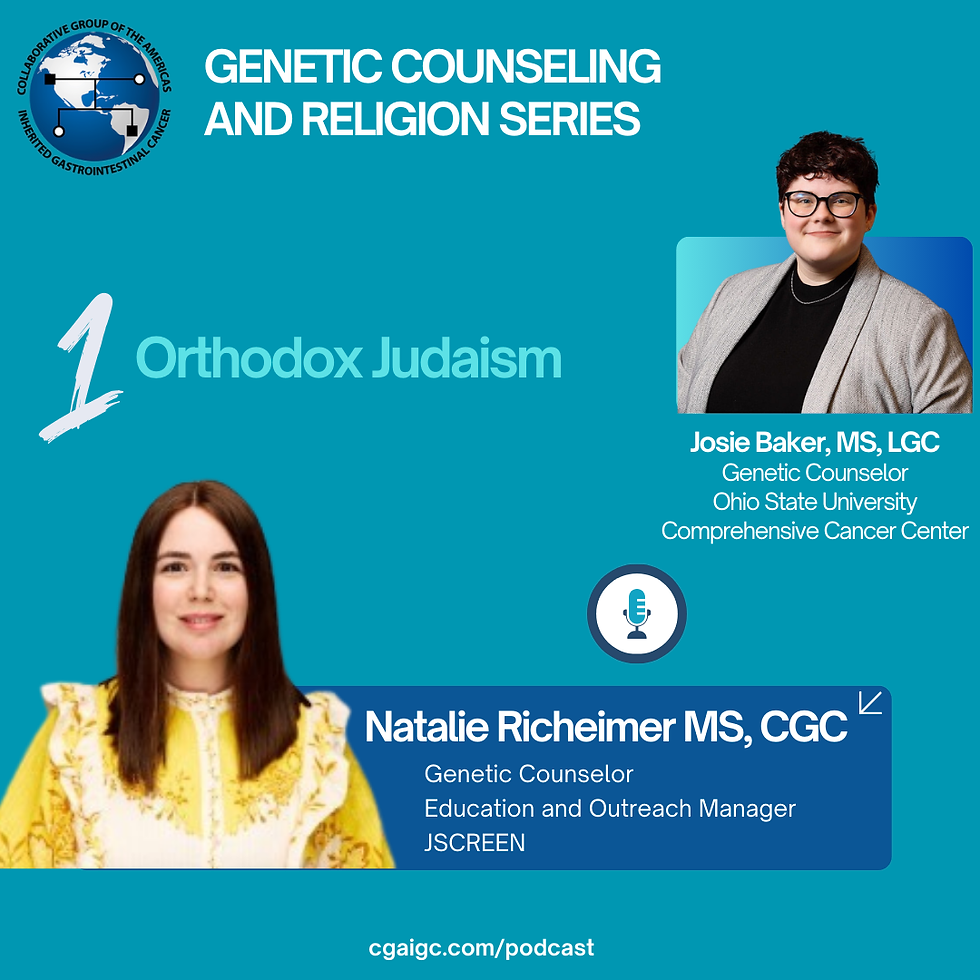Navigating Gynecologic Cancer Risk in Lynch Syndrome: A Closer Look at Evolving Guidelines
- CGA-IGC
- Jun 18, 2025
- 2 min read
Updated: Sep 9, 2025
Zachariah H. Foda, MD, PhD, CGA-IGC Communications Committee Member
In the latest episode of the CGA-IGC Podcast Series 2025, host Emma Keel, MS, CGC sits down with Ying Liu, MD medical oncologist at Memorial Sloan Kettering Cancer Center, and Nicole Edison, MD gynecologist at the University of Chicago, for an in-depth discussion on managing gynecologic cancer risk in patients with Lynch syndrome. The conversation spotlights the significant updates to the National Comprehensive Cancer Network (NCCN) guidelines released in September 2024 that have shifted the clinical approach to these patients.
Drs. Liu and Edison explain how these recent guidelines transition from broad Lynch syndrome recommendations to more gene-specific strategies, reflecting the differing cancer risks associated with individual gene mutations. This evolution empowers providers to offer more personalized, effective prevention strategies.
A key advancement featured in the new guidelines is the introduction of staged risk-reducing surgery—performing hysterectomy and salpingectomy (removal of the uterus and fallopian tubes) while considering postponement of oophorectomy (removal of the ovaries) until closer to natural menopause. Borrowed from BRCA management, this approach targets endometrial cancer risk reduction while aiming to delay the health consequences of early surgical menopause.
The episode addresses the implications of surgical menopause, including risks like osteoporosis, cardiovascular disease, cognitive changes, and impacts on sexual function. Both experts emphasize the protective role of hormone replacement therapy, particularly the use of estrogen-only formulations delivered transdermally after hysterectomy, which are associated with minimal risk.
Dr. Edison also provides practical insights into the surgical procedures, noting that most risk-reducing operations can be performed minimally invasively—often via laparoscopy or robotic assistance—with typical operative times of 60–90 minutes and recovery periods ranging from one to six weeks, depending on individual circumstances.
As the discussion concludes, Drs. Liu and Edison underscore several important reminders for healthcare providers: the importance of considering partner genetic testing for reproductive planning in younger Lynch syndrome patients; the fact that gynecologic cancers are frequently the index cancer that leads to Lynch syndrome diagnosis; and the critical need to pursue germline genetic testing, even when tumor findings are inconclusive or discordant with Lynch syndrome.
This episode provides invaluable guidance for genetic counselors, oncologists, gynecologists, and other healthcare professionals involved in the care of patients with Lynch syndrome. It underscores the expanding recognition of gene-specific cancer risks and the necessity of adopting individualized risk management strategies. By highlighting the latest evidence-based guidelines and best practices, this discussion supports a more nuanced and patient-centered approach to prevention and clinical care in this evolving field.
__________________________________________________________________________________
If you enjoyed this podcast, you may also like our CGA-IGC Research Collaboration series- or others from the CGA-IGC Podcast Series (Seasons 3, 4, 5, 6 & 7) presented by the CGA-IGC Education Committee. Or, explore our Expert Approach to Hereditary Gastrointestinal Cancers podcast series (Seasons 1 and 2). We're also on Spotify!
Also, looking for other educational resources? Toolkits? Webinars?
Our webinars are a valuable member benefit, and we encourage you to sign up as a member so you can join the live webinars and access our earlier webinar series on demand!
__________________________________________________________________________________





Comments